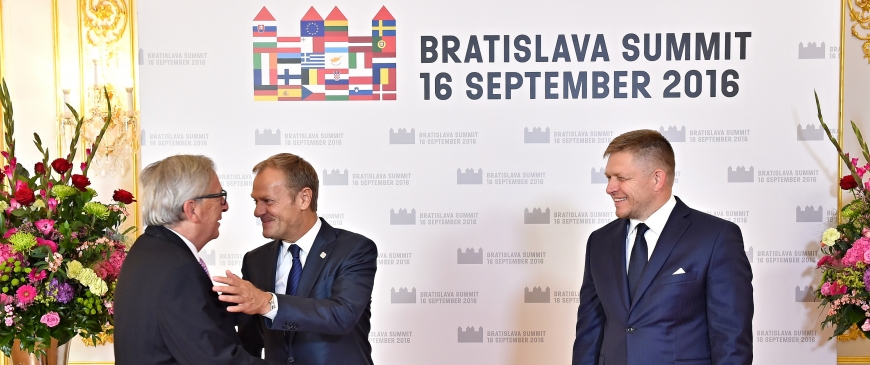
Juncker-Tusk: A clash of EU visions
On Wednesday (14 September), the president of the European Commission, Jean-Claude Juncker, delivered his annual state of the Union speech at the European parliament’s plenary session in Strasbourg. Juncker took stock of the current, rather bleak, state of affairs in the EU and laid out the commission’s priorities for the next 12 months.
The state of the Union is a powerful instrument in Brussels politics. In his annual speech (often characterised as a Christmas tree) the commission president promises individual political groups in the parliament that he will push forward their projects in exchange for their support in the parliament’s work on the commission’s other initiatives.
The state of the Union also offers an opportunity for MEPs to comment on the commission’s performance and thus manifest their growing influence in EU policy-making.
But this year’s speech was somehow different from previous ones.
Juncker used his state of the Union to address the European Council president, Donald Tusk, and his fellow European leaders rather than MEPs gathered in Strasbourg.
It is no secret that Tusk and Juncker have clashed over how the EU should respond to EU’s mounting crises. The state of the Union offered Juncker yet another opportunity to put his two cents into this debate and to confront Tusk’s stance on the EU’s future.
Masters of the treaty
Donald Tusk thinks that member states are "masters of the treaty" and should provide political stimulus for the EU. The European Commission should - in his view - implement the member states’ decisions by means of legislative actions.
The European Council president believes that at a time of growing euroscepticism and populism the last thing Europe needs is assertive institutions which “impose” their priorities on member states.
But Juncker does not agree with this vision. He wants the commission to regain its right of initiative, which has been in decline ever since the sovereign debt crisis erupted.
Juncker thinks that European deliberations have been too-long dominated by national interests which have only boosted populism across the EU. He believes that a more political commission can help to address this problem rather than exacerbate it.
In his speech he condemned “petty envy between various institutions” and argued against re-nationalisation of European policy. He also announced that the commission will come up with ideas for the future of Europe in March 2017.
This runs up against Tusk’s idea that member states rather than EU institutions should be a driving force of any wider EU reform.
Rifts between the two presidents are particularly worrying as EU leaders are meeting in Bratislava to get ready for the Brexit negotiations, unprecedented in the EU’s history.
Leave weapons at the door
The European Commission backed by the European Parliament seems to be keen on using the exit talks to teach Britain a lesson; the European Council president understands, however, that this approach could be counterproductive and embolden eurosceptic forces.
Eurosceptics could argue that an autocratic EU is trying to punish Britain for a democratic decision.
All three of the main EU institutions have appointed Brexit negotiators, which has caused confusion among EU experts and in EU capitals over who will be in charge of the talks.
In his state of the Union, Juncker argued that Brexit will not lead to the EU’s break-up.
He is probably right that the EU will somehow survive this crisis. But the secret to a more positive EU future lies in a united EU front in the divorce talks. As both presidents go to Bratislava for discussions with 27 EU leaders (bar Britain), they should leave their knives at the door.
The commission’s passion for the EU’s fundamental principles and Tusk’s understanding of different concerns across member states could make a potent combination if they act together.
They could also make an explosive cocktail if they don't.
Agata Gostynska-Jakubowska is a research fellow at the Centre for European Reform in London. She works on the EU institutional architecture and on the British and Polish European policy.
